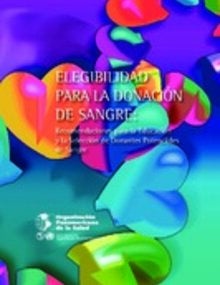PAHO considers it essential to provide the National Blood Programs with resources that allow them to develop appropriate programs for blood donor education, recruitment, and selection. This document summarizes the rationale for the parameters and conditions that should be taken into consideration in the education and selection of blood donors, in the level of detail that should allow blood service staff, community volunteers and prospective blood donors to understand them.
As illustration of how the parameters are applied in various countries, the selection criteria of the American Association of Blood Banks (AABB), Council of Europe (CoE), Héma–Québec (H-Q) (Canada), the Australian Red Cross (ARC), the Caribbean Regional Standards (CRS) and the Estándares de Trabajo para Servicios de Sangre are presented as examples. In addition, the document includes recommendations made by PAHO to the national health authorities and the national blood programs in order to promote multidisciplinary and coordinated approaches for health promotion, public education, universal and regional human and patient rights —as applicable to blood donors and recipients—, quality assurance and financial efficiency in the issues pertaining to sufficiency, availability, access, quality, safety, and timeliness of blood for transfusion.
It is important to keep in mind that these recommendations should be reevaluated when additional information or evidence becomes available.
|

